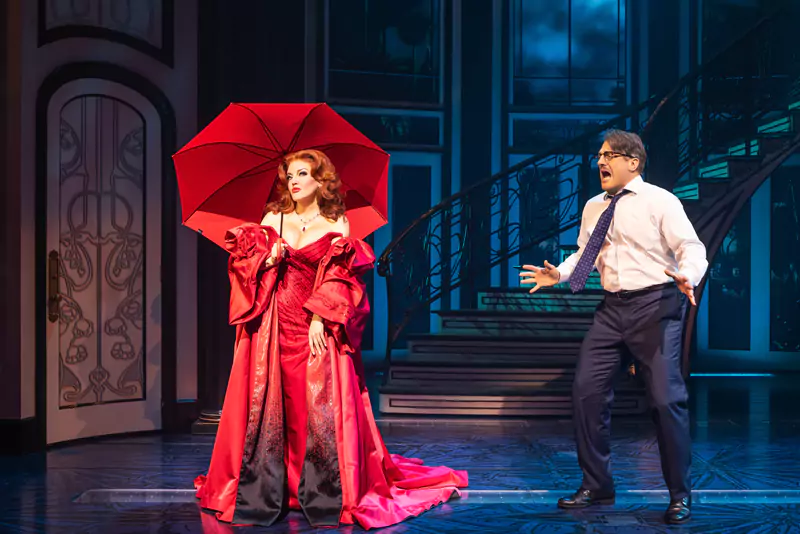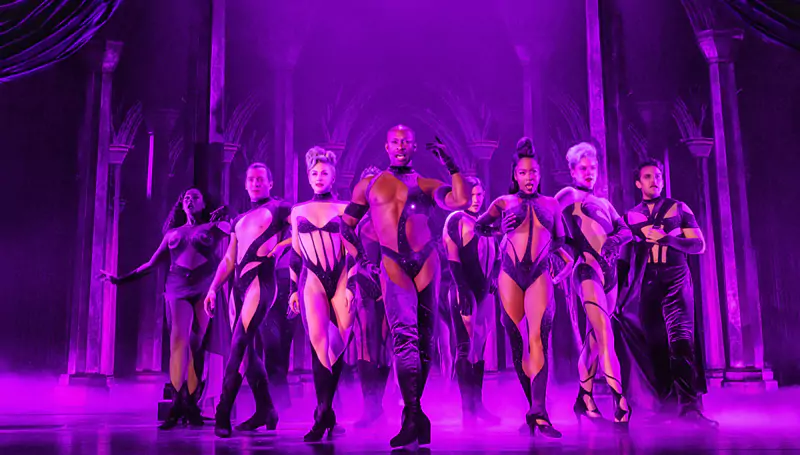“Death Becomes Her” at Lunt-Fontanne Theatre
11 December 2024
Glenda Frank on Broadway
Some people anguish over theological mysteries. Will we be reunited with family and friends after death? Will there be judgment, rewards and punishments? What about reincarnation?
But in Death Becomes Her now at the Lunt-Fontanne Theatre, Helen Sharp (Jennifer Simard) and Madeline Ashton (Megan Hilty) have simple desires – eternal youth and beauty. Unlike married couples, these aging frenemies don’t buy “until death do us part.” Their bond may be violent, but it is postmortem. (The setting of the musical is “Then, now, and beyond.”) And they find just the person to help them on their quest, the sultry, sexy, glamorous Viola Van Horne (Michelle Williams, of “Destiny’s Child” fame).

Christopher Sieber.
Photo credit: Matthew Murphy and Evan Zimmerman.
There is so much to enjoy in this movie-to-musical makeover with book by Marco Pennette (television series Ugly Betty) and Broadway newbies Julia Mattison and Noel Carey (music and lyrics). Much of that is thanks to director/choreographer Christopher Gattelli (2012 Tony for Newsies), who elevates this funny and surprisingly poignant story to new heights.
Mattison’s book is coy and wry. The women, especially Madeline, are nasty and cutting, overdosing on schadenfreude but also endearingly confessional. When Helen praises Madeline’s beauty, the actress responds: “Thanks to my hair, makeup and neck team . . . also that Tapeworm Diet. Everyone at CAA is just shitting their brains out.” But modesty is not her forte. Her current show is titled “Me! Me! Me!” Madeline belts out “For the Gaze” with its shameless pandering pun. These women are our wicked selves. Competition is their oxygen and despite a huge belly hole from a rifle shot or a neck twisted backwards, they just keep going. These are bad girls (and performances) to admire.
In the beginning, Helen, a frumpy novelist, breaks our heart. Trying for years (since Madeline’s first rhinoplasty) to defeat the bewitching Madeline at anything , she’s finally found her ace, her devoted fiancé, Dr. Ernest Menville (Christopher Sieber), and she presents him to the show biz diva with total confidence that she has won this round.
The outcome is predictable, but we get to watch Madeline in action. There is no trace of subtlety. First, she recaps Helen’s worst failures, then she begins the seduction. Soon Ernest is Madeline’s henpecked husband and personal plastic surgeon – her dream partner. But plastic surgery and husbands go just so far. Enter Chagall (Taurean Everett), Viola’s assistant and peregrinating salesman with his vial of jewel-colored elixir.

Jennifer Simard and Christopher Sieber.
Photo credit: Matthew Murphy and Evan Zimmerman.
This is familiar from the 1992 Universal film by Martin Donovan and David Koepp, directed and produced by Robert Zemeckis and starring Meryl Streep, Goldie Hawn, Bruce Willis and Isabella Rossellini. A critical difference on stage is Gattelli’s sharp direction and choreography and Paul Tazewell’s costumes.
Julia Mattison shared that she “had so much fun writing this show it should be illegal”. The same might be said about the dancers. They look like they are enjoying the movements, a mélange of familiar dance combinations and flowing routines that emphasized the toned muscles and range of the gypsy chorus. Their costumes by Tazewell (inspired by the choreography) are a celebration of the human form with strategically placed strips of black fabric and sheer patches, no two costumes being the same. It’s as though you can’t not dance once you put them on. There are, of course, the ultraglamorous and the overly dowdy outfits, as befits a comedy, and they too are a visual pleasure. Noteworthy are those for Stefan (a charismatic John Lamon) as Madeline’s ungendered assistant.
The second act sacrifices a little of its pizazz as it adheres closer to the plot and special effects. But the stunt work, visual tricks, and cosmetic embarrassments hold their own. Warren Yang’s (a stand-in for Madeline) slow, contorted tumble down the stairs is riveting and results in twisted limbs and a neck dislocated from its torso (illusionist Tim Clothier). The women’s bizarre make-up at the end (Joe Dulude II, Suffs) is even funnier because many of us have seen similar excesses on New York streets.
Even in memory, this is a very funny production. Set designs by Derek McLane and lighting by Justin Townsend, although a little heavy-handed at times, are high quality work.









